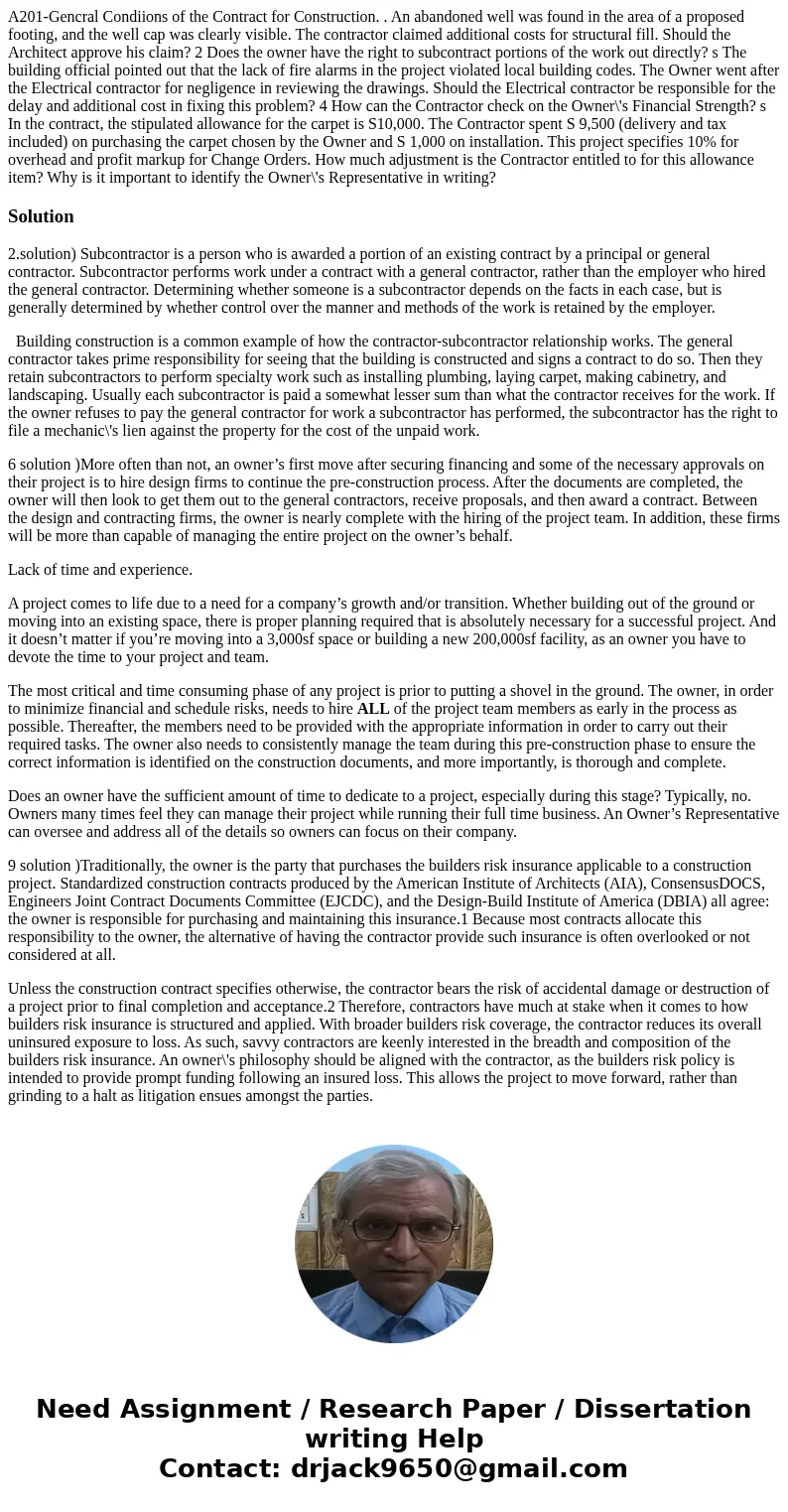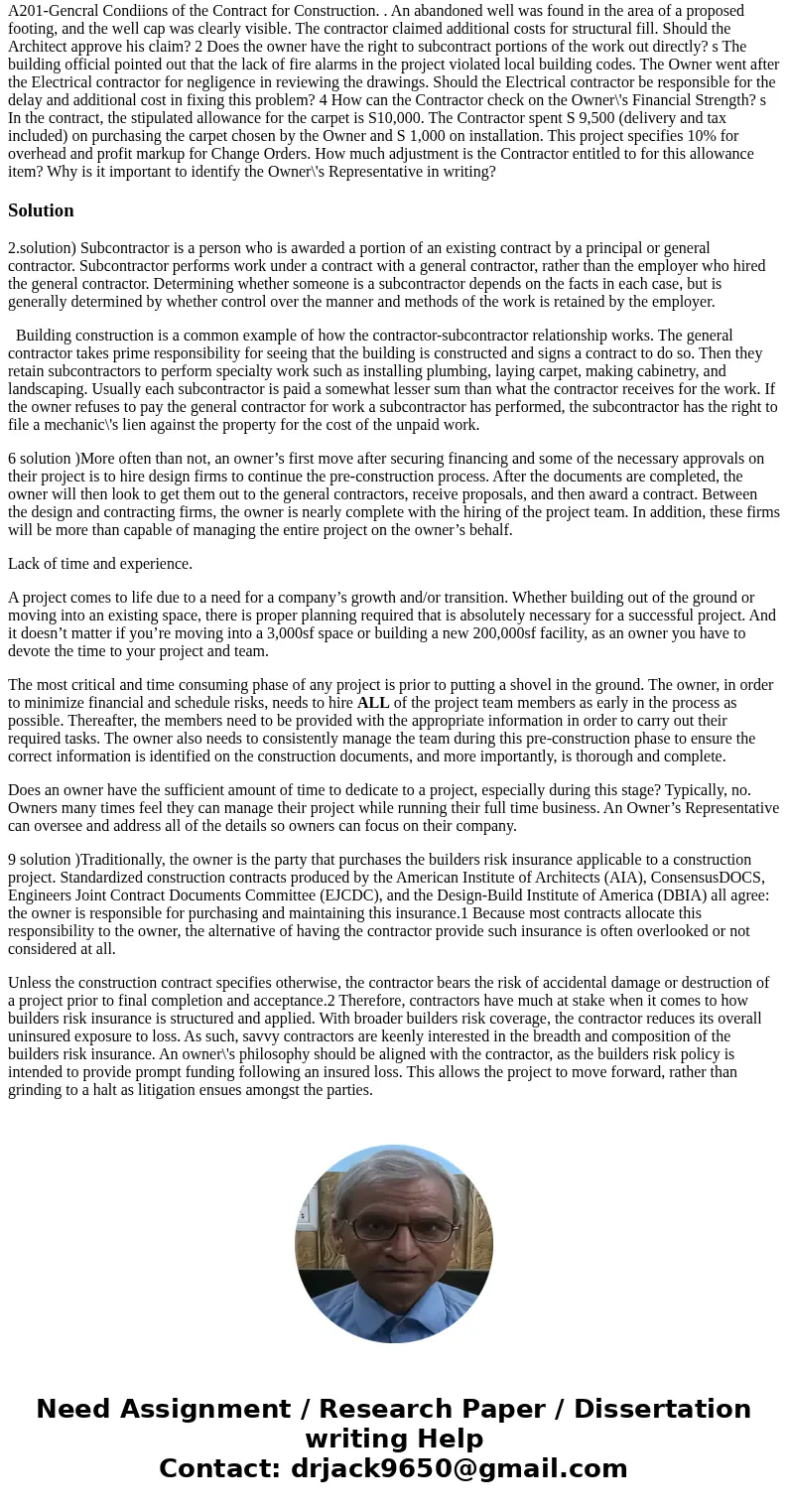A201Gencral Condiions of the Contract for Construction An a
Solution
2.solution) Subcontractor is a person who is awarded a portion of an existing contract by a principal or general contractor. Subcontractor performs work under a contract with a general contractor, rather than the employer who hired the general contractor. Determining whether someone is a subcontractor depends on the facts in each case, but is generally determined by whether control over the manner and methods of the work is retained by the employer.
Building construction is a common example of how the contractor-subcontractor relationship works. The general contractor takes prime responsibility for seeing that the building is constructed and signs a contract to do so. Then they retain subcontractors to perform specialty work such as installing plumbing, laying carpet, making cabinetry, and landscaping. Usually each subcontractor is paid a somewhat lesser sum than what the contractor receives for the work. If the owner refuses to pay the general contractor for work a subcontractor has performed, the subcontractor has the right to file a mechanic\'s lien against the property for the cost of the unpaid work.
6 solution )More often than not, an owner’s first move after securing financing and some of the necessary approvals on their project is to hire design firms to continue the pre-construction process. After the documents are completed, the owner will then look to get them out to the general contractors, receive proposals, and then award a contract. Between the design and contracting firms, the owner is nearly complete with the hiring of the project team. In addition, these firms will be more than capable of managing the entire project on the owner’s behalf.
Lack of time and experience.
A project comes to life due to a need for a company’s growth and/or transition. Whether building out of the ground or moving into an existing space, there is proper planning required that is absolutely necessary for a successful project. And it doesn’t matter if you’re moving into a 3,000sf space or building a new 200,000sf facility, as an owner you have to devote the time to your project and team.
The most critical and time consuming phase of any project is prior to putting a shovel in the ground. The owner, in order to minimize financial and schedule risks, needs to hire ALL of the project team members as early in the process as possible. Thereafter, the members need to be provided with the appropriate information in order to carry out their required tasks. The owner also needs to consistently manage the team during this pre-construction phase to ensure the correct information is identified on the construction documents, and more importantly, is thorough and complete.
Does an owner have the sufficient amount of time to dedicate to a project, especially during this stage? Typically, no. Owners many times feel they can manage their project while running their full time business. An Owner’s Representative can oversee and address all of the details so owners can focus on their company.
9 solution )Traditionally, the owner is the party that purchases the builders risk insurance applicable to a construction project. Standardized construction contracts produced by the American Institute of Architects (AIA), ConsensusDOCS, Engineers Joint Contract Documents Committee (EJCDC), and the Design-Build Institute of America (DBIA) all agree: the owner is responsible for purchasing and maintaining this insurance.1 Because most contracts allocate this responsibility to the owner, the alternative of having the contractor provide such insurance is often overlooked or not considered at all.
Unless the construction contract specifies otherwise, the contractor bears the risk of accidental damage or destruction of a project prior to final completion and acceptance.2 Therefore, contractors have much at stake when it comes to how builders risk insurance is structured and applied. With broader builders risk coverage, the contractor reduces its overall uninsured exposure to loss. As such, savvy contractors are keenly interested in the breadth and composition of the builders risk insurance. An owner\'s philosophy should be aligned with the contractor, as the builders risk policy is intended to provide prompt funding following an insured loss. This allows the project to move forward, rather than grinding to a halt as litigation ensues amongst the parties.


 Homework Sourse
Homework Sourse